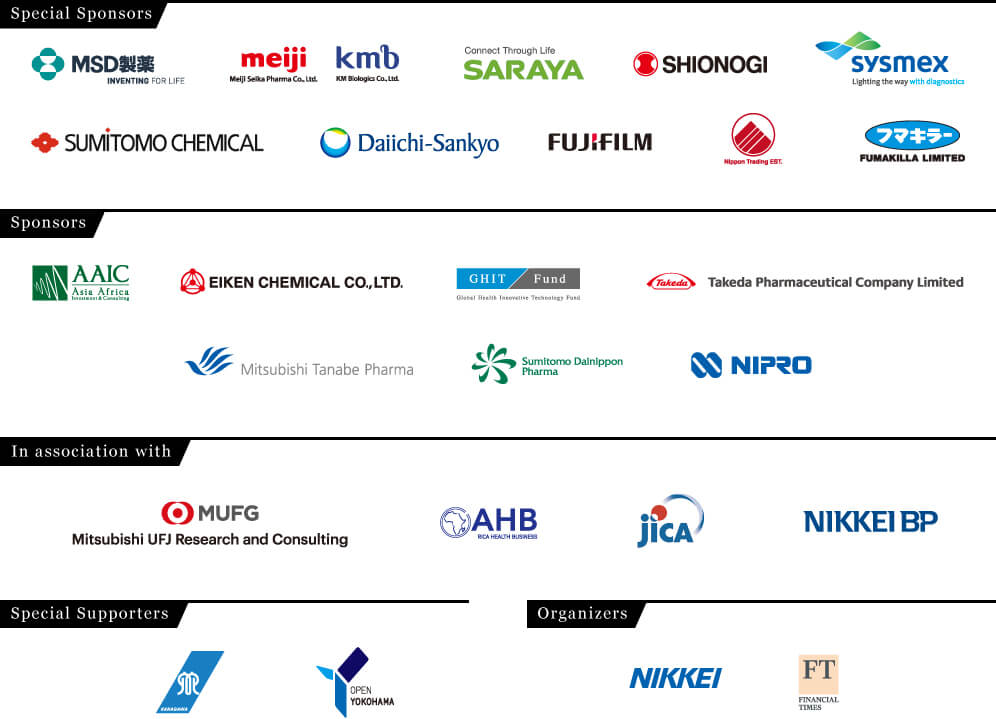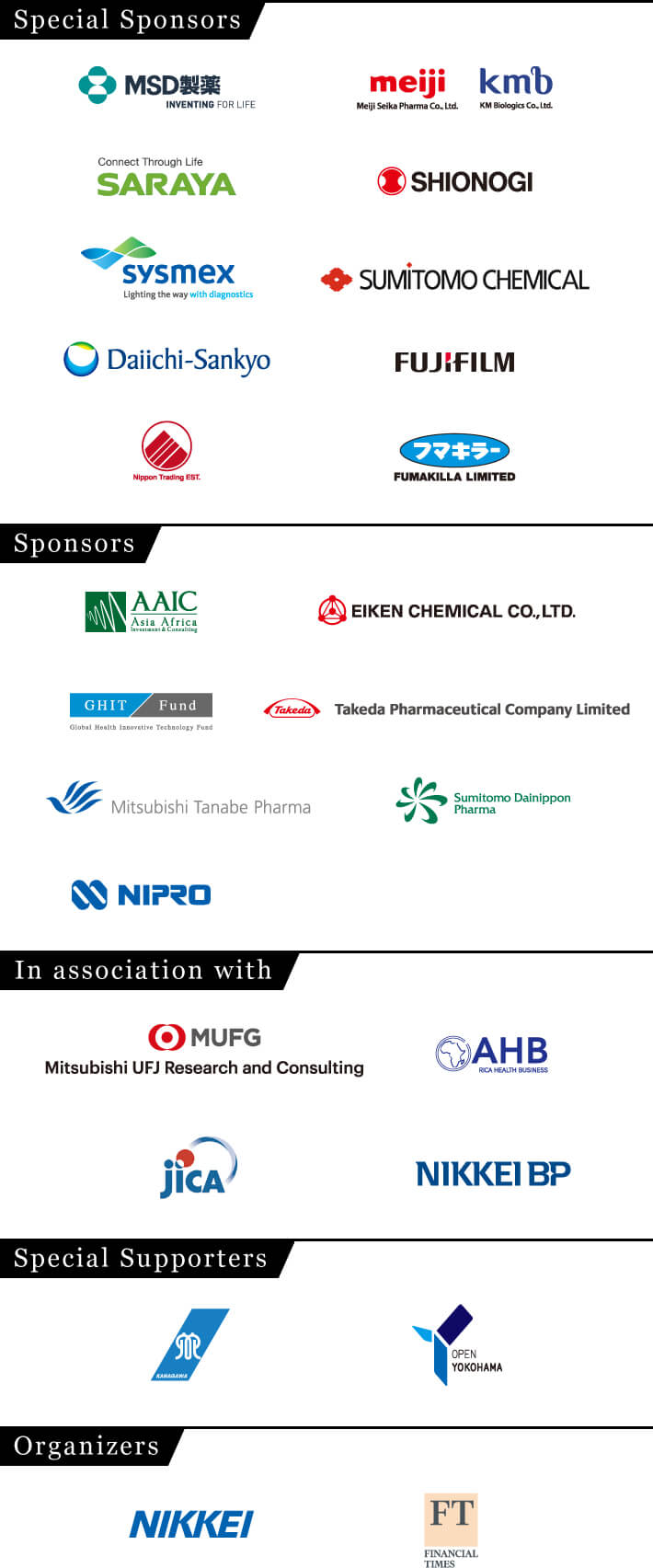- OVERVIEW
- SPEECH & TALK SESSION
-
AGENDA
- Progress and Perspective of TB Consortium P3 Projects
- Ebola Outbreaks in DRC; Emergency Usage of Unapproved Potential Medical Drugs
- Achievements of Malaria Consortium and its Future Challenges
- Global PPP against the Risks of AMR; Challenges towards the Next Step
- Establishment of Clinical Research Platform in Asia and Africa
- Future of Technology: Where should we go toward?
- UHC and Communicable Diseases: Tradition and Innovation
- INTERVIEW
AGENDA
AGENDA 2, 3, 4
2.Progress and Perspective of TB Consortium P3 Projects
Moderator: Dr. Kazunari Asanuma, MD, PhD Councillor for Environmental Health and Food Safety,
Minister's Secretariat, Ministry of Health, Labour and Welfare
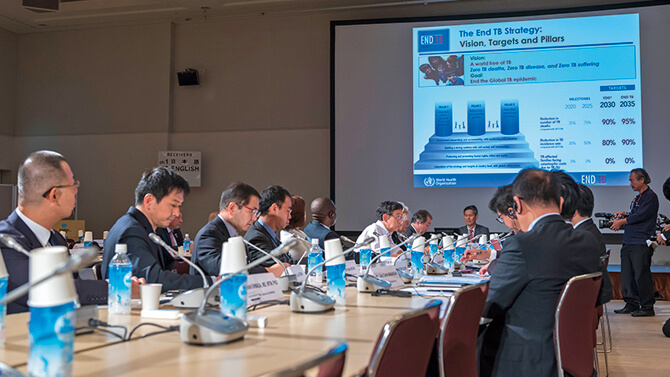
In the tuberculosis session, the progress status and outlook for the P3 project conducted by AMIC’s tuberculosis division were presented.
First, Dr. Seiya Kato (Research Institute of Tuberculosis) presented chest X-ray image interpretation technology applying AI, which had been jointly developed by FUJIFILM and a Korean partner, and “TGS-TB”, a high accuracy tool for analyzing whole genome sequencing (WGS) data of drug-resistant tuberculosis bacteria developed by the National Institute of Infectious Diseases.
Next, Prof. Nikki Shindo (WHO) reported on END TB, an ambitious strategy being followed by WHO to reduce tuberculosis incidence by 90%, deaths due to tuberculosis by 95% due to it by 2035.
Then, from the corporate standpoint regarding specific progress in a tuberculosis P3 project, Mr. Hiroshi Yoshida (NIPRO) and Mr. Hajime Watari (EIKEN Chemical) reported “GenoScholar”, a multi-drug resistance genetic testing device, and “TB-LAMP”, a genetic test for use in screening, respectively on activities.
This was followed by discussion of the situation in countries where TB is epidemic. In it, Dr. Abidan Chansa (Ministry of Health Zambia), Dr. Erlina Burhan (Universitas Indonesia), and Mr. Celso Cachin Manangan (SteraMist Philippines) emphasized the importance of promoting good health in SDGs.
3.Ebola Outbreaks in DRC; Emergency Usage of Unapproved Potential Medical Drugs
Moderator: Mr. Mitsuru Miyata Executive Leader Writer, Nikkei Business Publications, Inc.
In the Ebola session that followed, there was discussion on the efforts of Japan and the international community with respect to the large-scale Ebola outbreak in the DRC.
First, reporting the local situation, Dr. Hiroyuki Kato (MEDECINS SANS FRONTIERES JAPAN) said that Ebola treatment centers were not trusted by people, the death rate in communities was high and it had been difficult to assess the epidemiological situation.
Next, Mr. Koichi Yamada (FUJIFILM) and Dr. Richard Kaszynski (Senior Medical Advisor, DRC) mentioned the potential for favipiravir, a drug developed in Japan, to be useful in preventing Ebola post exposure.
Regarding the Japanese government’s support of efforts by PPPs, Mr. Akira Yasui (Cabinet Secretariat) presented Japan’s response to communicable diseases that are a global threat.
Then, Dr. Yasuhiro Fujiwara (PMDA) reported the current situation of and future challenges for Japanese schemes for the acceptance of unapproved medicines and off-label use in Japan and other countries.
Also, giving Toray’s personal protective equipment (PPE) as an example, Prof. Jiro Yasuda (Nagasaki University) emphasized that for the local introduction of a technology, both the capabilities of individual companies and government collaboration were essential.
4.Achievements of Malaria Consortium and its Future Challenges
Moderator: Prof. Kiyoshi Kita Dean and Professor, School of Tropical Medicine and Global Health,
Nagasaki University
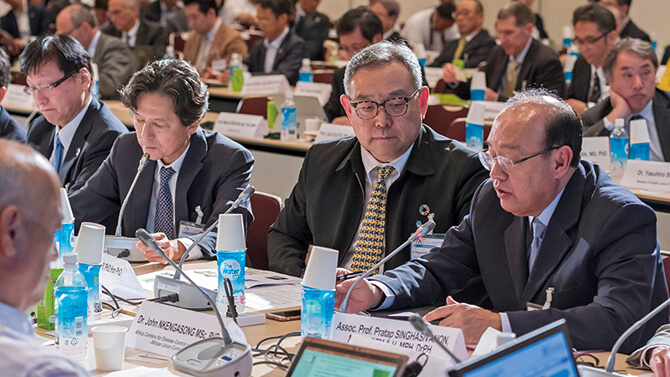
Regarding malaria, in 2016, the malaria division was inaugurated as a Japanese initiative toward its elimination. As epidemic patterns and social backgrounds differ, separate task forces have been set up for Asia and Africa.
First, Mr. Ray Nishimoto (Sumitomo Chemical) described the current situation of a special mosquito net and drugs for vector control, Mr. Yoshihide Hiruta (Sysmex) that of a fully-automated hematology analyzer for detecting infection by the malaria parasite and Dr. Yasuyoshi Mori (EIKEN Chemical) a genetic testing reagent and device for detecting malaria based on Malaria-LAMP technology.
Dr. Shigeyuki Kano (NCGM) and Assoc. Prof. Pratap Singhasivanon (Mahidol University, Thailand) reported the activities of the Asia task force, emphasizing measures focusing on asymptomatic patients.
Regarding the Africa task force, Prof. Akira Kaneko (Osaka City University Graduate School of Medicine) spoke about the efforts to introduce the SATREPS framework, which supports the local introduction of Japanese technology and local researchers.
Prof. Tomohiko Sugishita (Tokyo Women’s Medical University) reported the activities of the Africa Business Consortium in making malaria control a sustainable business.
AGENDA 5
Global PPP against the Risks of AMR; Challenges towards the Next Step
Moderator: Mr. Yasuhide Yamada Former Director-General of Coordination Office of Measures
on Emerging Infectious Diseases, Cabinet Secretariat, Government of Japan Executive
Officer, SHIMIZU CORPORATION
In this session, the present situation of AMR, and measures against it were discussed. An analysis carried out in the UK in 2014 were presented. It estimated that as of 2014, 700,000 people were dying because of AMR annually and made the frightening forecast that if measures were not taken, 10 million people would be dying annually in 2050.
At the beginning, Dr. Kensuke Shoji (National Center for Child Health and Development) reported that in Japan, infections due to AMR bacteria had started to occur and had become a major problem at clinics where children were treated.
Next, Dr. Hajime Inoue (NCGM) mentioned that while AMR had been receiving attention since at least 70 years ago in academia, politicians had only started to give it attention it in the last 5 years. He said that it had now been recognized as an important global challenge.
Then, Dr. Kazuhiro Tateda (Toho University School of Medicine) presented current situation of Japan’s action plan, commenting that the targets for decreased use of antibacterial drugs had not been reached.
From the standpoint of the pharmaceutical industry, Dr. Yasunori Tawaragi (JPMA), Mr. Thomas Cueni (IFPMA), Ms. Takuko Sawada (Shionogi) and Dr. Takeo Morooka (MSD) were all in agreement regarding the current situation of drug development: the value of developing and launching antibacterial agents is negative to companies, and ‘pull’ incentives are essential for preventing large numbers of deaths due to AMR.
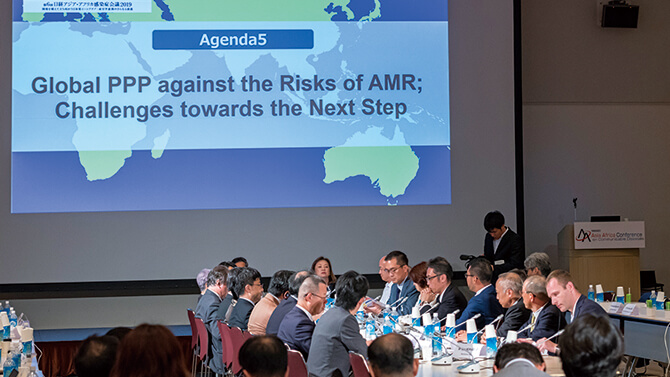
Dr. Hideaki Hanaki (Kitasato University) commented that the number of new antibacterial drugs development was increased in the US by such as introduction of fast-track review process.
AGENDA 6
Establishment of Clinical Research Platform in Asia and Africa
Moderator: Mr. Mitsuru Miyata Executive Leader Writer, Nikkei Business Publications, Inc.
In June this year, AMIC’s Asian Clinical Trials Platform Working Group submitted a proposal for the creation of a clinical trial platform in Asia to the government, which included the establishment of clinical trial centers in Thailand and Indonesia and requested financial support of around ¥6.04 billion over the next 10 years. In this session, the future of the platform was discussed based on the details of this proposal.
Dr. Yasuhiro Yasutomi (NIBIOHN) commented that the establishment of clinical trial centers in Asian countries would be a win-win situation, considering that they would support healthcare in Asian countries and help promote development.
Prof. Suchinda Malaivijitnond (Chulalongkorn University, Thailand) a potential recipient, noted that the clinical research industry was growing in Thailand and that people in her country were prioritizing access to high quality vaccines. Dr. Erlina Burhan (Universitas Indonesia) said that in her country, with 840,000 new tuberculosis patients annually, there were great prevention and treatment needs.
Next, Mr. Kazuhiko Mori (Ministry of Health, Labour and Welfare) commented from the standpoint of the receiver of the proposal. He said that in June this year, the Cabinet had compiled “Grand Design for Asian Pharmaceutical and Medical Device Regulatory Harmonization” and it included the creation of clinical trial infrastructure. This suggested that the division’s proposal had been positively evaluated within government.
Among conditions for the success of vaccine development under a clinical trial platform, Dr. Patricia A. Darrah (NIH) cited leadership for researchers, in-house clinical trial capabilities, and sustained government funding.
Dr. Tatsuya Kondo (Medical Excellence JAPAN) emphasized that government and industry had to collaborate in promoting regulatory harmonization between Japan and Asian countries.
There were also expectations and enthusiasm in academia. Prof. Kiyoshi Kita (Nagasaki University) welcomed the creation of the clinical trials platform because it would be an encouragement to deliver diagnostics, vector control and the results of drug discovery to patients for malaria, a disease not seen in Japan.
Dr. Tatsuo Iiyama (NCGM) commented that in the creation of a clinical trial platform, tuberculosis and malaria researchers would need to collaborate with NCGM in view of its expertise in evaluation techniques and regulatory science. Prof. Hitoshi Oshitani (Tohoku University) positively evaluated the clinical trials platform in terms of human resources development, given that there are few researchers capable to conduct global level clinical research in Japan.
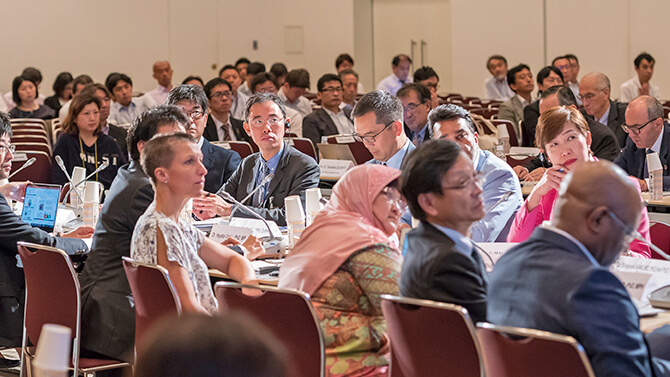
However, from the end of clinical trials onwards, social infrastructure for the delivery of drugs to patients in local areas was a major issue. Dr. Yasuyuki Sahara (Ministry of Health, Labour and Welfare) commented that it was necessary to think about UHC in the broad context in order to ensure access to drugs and diagnostics. Dr. Manabu Sumi (Ministry of Foreign Affairs) noted access/delivery partnerships should be conducted in conjunction with UNDP.
Prof. Nikki Shindo (WHO) highly evaluated the commitment made by the government to realize the details of the proposal from the conference within 5 years.
Dr. John Nkengasong (Africa CDC) said that the clinical trial platform was also necessary for Africa and hoped that its framework would be realized in African countries.
AGENDA 7,8
7.Future of Technology: Where should we go toward?
Moderator: Mr. Mitsuru Miyata Executive Leader Writer, Nikkei Business Publications, Inc.
Mr. Michikazu Koshiba Head, Center on Global Health Architecture /
General Manager, Social Impact Partnership Business Dept., MITSUBISHI UFJ
RESEARCH AND CONSULTING CO., LTD.
In the new technology session, the use of AI and other new technologies in global health settings worldwide was discussed. Since the beginning of this century, WHO has been reinforcing its digital strategies and in June 2019, announced a digital health global strategy for 2020-2024.
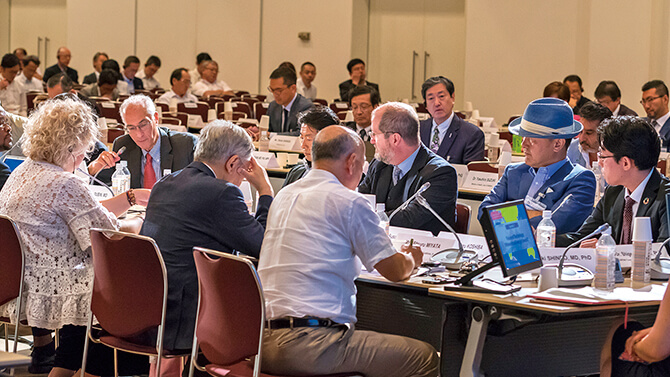
During the discussion, it was reported that unlike developed countries, which are subject to various regulatory restrictions, in Africa, health care businesses using new technologies were quickly becoming commercial ventures.
However, it was mentioned that new technologies should have consideration for not only accessibility but also disadvantaged people while paying attention to fairness.
8.UHC and Communicable Diseases: Tradition and Innovation
Moderator: Mr. Michikazu Koshiba Head, Center on Global Health Architecture /
General Manager, Social Impact Partnership Business Dept., MITSUBISHI UFJ RESEARCH AND
CONSULTING CO., LTD.
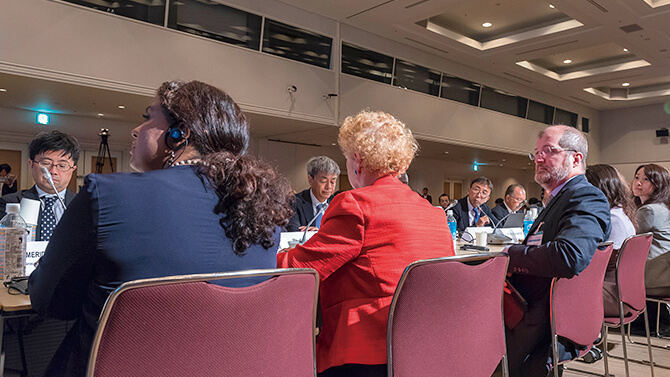
In the UHC session, governance, service delivery, finance and human resources, the major elements of UHC, were discussed. In the presentations, whose subjects ranged from system theory to case studies, many of the speakers stressed the necessity of local systems and capability building for people in local areas.
Mr. Tsunenori Aoki (JICA) commented that giving respective countries financial capabilities was more important than international funding.


